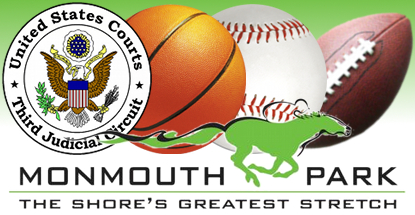 New Jersey’s Monmouth Park racetrack wants in on the burgeoning fantasy sports betting business. On Saturday, adviser Dennis Drazin said the track was still mulling the potential legal ramifications of such a move given Friday’s summary judgment against the state’s real-money sports betting plans. But Drazin said “on its face, the Court’s ruling does not restrain Monmouth Park from partaking in” fantasy sports.
New Jersey’s Monmouth Park racetrack wants in on the burgeoning fantasy sports betting business. On Saturday, adviser Dennis Drazin said the track was still mulling the potential legal ramifications of such a move given Friday’s summary judgment against the state’s real-money sports betting plans. But Drazin said “on its face, the Court’s ruling does not restrain Monmouth Park from partaking in” fantasy sports.
Drazin offered no timeline for when fantasy play might commence other than “in the near future.” Monmouth is already offering ‘free play’ wagers at its facility, with an average of 1,500 players per week making wagers in the hopes of winning non-cash prizes. Monmouth has had a real-money sports betting deal with the US division of UK bookies William Hill for around 18 months that is still waiting to take its first real wager.
As for when New Jersey might learn its fate with the Third Circuit Court of Appeals, the latest estimates are that the state and its opponents – the Department of Justice, the NCAA and four pro sports leagues – will file their respective written briefs by the end of February, with oral arguments following in late March or early April. Assuming all that goes to plan, a three-judge panel of the Court could issue a ruling between May and July, after which the losing side will most certainly ask for an ‘en banc’ hearing in front of all the Court’s judges.
Attorney Daniel Wallach (@WALLACHLEGAL), who has followed this case like Inspector Javert followed Jean Valjean, told Sports Illustrated that New Jersey’s chances of a favorable Third Circuit ruling could be no higher than 25%. The Third Circuit’s 2013 rejection of the state’s previous appeal said individual states looking to comply with the federal PASPA sports betting prohibition were free to repeal state-level prohibitions and were similarly free “to decide what the exact contours of the prohibition will be.”
But Wallach believes this ‘exact contours’ language “was never intended to be a ‘loophole’ for states to exploit” in a bid to do an end-run around PASPA. Wallach believes the Court was attempting to illustrate that PASPA didn’t ‘commandeer’ states to enforce unwanted state-level laws against betting and thus did not fall afoul of the US Constitution’s 10th Amendment.
New Jersey’s latest legislative effort would partially repeal its state-level ban, allowing sports betting at Atlantic City casinos and state racetracks without formally licensing or regulating the practice. In Friday’s ruling, Judge Michael Shipp noted that Judge Thomas Vanaskie, the lone dissenting voice in the 2013 Third Circuit rejection, suggested states were faced with a binary choice of all-out repeal or maintaining local prohibitions.